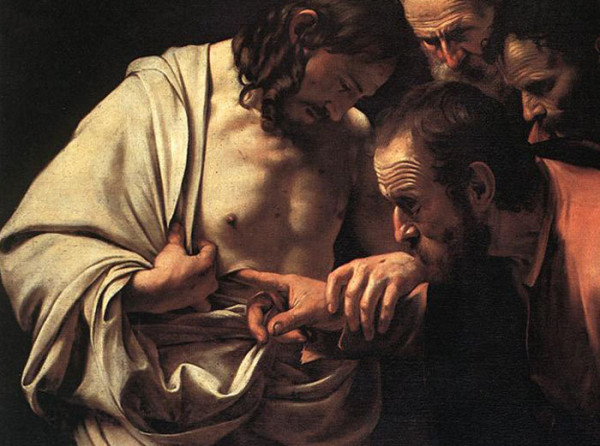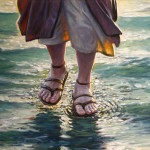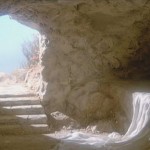David Hume, Miracles, and the Resurrection
by Fr. Dwight Longenecker
Filed under The Existence of God, The Resurrection
Most Catholics and atheists agree that if God does not exist, then the material world must be a closed system. If there is no God, the world is self-creating and self-reliant. If there is no God, then there cannot be interruptions in nature. The material world works according to the laws of physics, and even if there are mysteries that cannot presently be explained, they will be one day. In fact, if there is no God, then the physical world must work according to the laws of nature and nothing else.
If however, it can be shown that there is a force which interrupts and alters the ordinary working of nature, and if that force operates in an intelligible and rational way, then there must be an intelligent being that religious people have always identified as God.
This intelligible and rational interruption in the laws of nature is what we call a “miracle.”
The interruption is intelligible and rational if it has a reason and an understandable purpose. An interruption which is purely random or arbitrary would not indicate a super-physical intelligence.
All that to say this: if there are miracles, then there is a God. The problem with many miracles is that they might be attributed to natural causes or to natural causes which we do not yet understand. This is where the Easter miracles comes in. Firstly, if one miracle can be shown to have happened, then the case is proven. One miracle breaks the whole idea that the world is self-contained, self-creating, and self-reliant, and the one miracle which atheists should most seriously consider is the miracle of the resurrection of Jesus Christ.
The eighteenth century skeptic David Hume argued that when weighing up the evidence for a miracle one had to consider which was more probable–that a person would lie or that a given miracle would take place. So he writes in An Enquiry Concerning Human Understanding:
"The plain consequence is (and it is a general maxim worthy of our attention), 'That no testimony is sufficient to establish a miracle, unless the testimony be of such a kind, that its falsehood would be more miraculous, than the fact, which it endeavors to establish….’
When anyone tells me, that he saw a dead man restored to life, I immediately consider with myself, whether it be more probable, that this person should either deceive or be deceived, or that the fact, which he relates, should really have happened. I weigh the one miracle against the other; and according to the superiority, which I discover, I pronounce my decision, and always reject the greater miracle. If the falsehood of his testimony would be more miraculous, than the event which he relates; then, and not till then, can he pretend to command my belief or opinion."
In other words, if someone believes a miracle has taken place he is either lying himself or has been lied to. If the claimed miracle is greater than the possibility of a person being deceived or deceiving, then that claimed miracle must be rejected. Hume’s argument seems watertight because it is based on the assumption that the physical world is watertight. His conclusion rests on his first premise that the physical world is a closed system. What Hume is really saying is that miracles are impossible because miracles are impossible.
But the definition of a miracle is that it is an interruption in what was expected to be a closed system. That’s why it’s a miracle.
By its very definition a miracle breaks into the closed system, and to deny a miracle by simply presuming it can’t happen is to skirt the argument. Hume uses the example of a dead man rising again because he knows this is the central miracle. If this miracle, then any miracle. And if any miracle, then the system is not closed. And if the system is not closed, then there is a being greater than the system and that being we recognize as God.
Hume’s argument against miracles has been a cornerstone of the atheist position on miracles but it is rarely examined closely. Hume does not discuss evidence for such a miracle. He simply places the possible miracle over against the testimony of a person who claims the miracle. What he avoids in the Easter miracle is that it is not one man claiming a miracle, but many, and that their testimony is backed up by evidence that cannot be plausibly interpreted in any other way.
When the evidence is examined, Hume’s reductionist argument—that we must believe the theory that is most likely to be true—actually helps prove the resurrection. This is because all the alternatives to the fact of the resurrection of Jesus Christ from the dead are more incredible than the miracle.
It therefore all stands or falls on the miracle of the resurrection. St. Paul, a skeptic turned believer, addresses this very question his first letter to the Corinthians.
"Now, brothers and sisters, I want to remind you of the gospel I preached to you, which you received and on which you have taken your stand. By this gospel you are saved…Otherwise, you have believed in vain. For what I received I passed on to you as of first importance: that Christ died for our sins according to the Scriptures, that he was buried, that he was raised on the third day according to the Scriptures, and that he appeared to Cephas, and then to the Twelve.
After that, he appeared to more than five hundred of the brothers and sisters at the same time, most of whom are still living, though some have fallen asleep. Then he appeared to James, then to all the apostles, and last of all he appeared to me also…
And if Christ has not been raised, our preaching is useless and so is your faith. More than that, we are then found to be false witnesses about God, for we have testified about God that he raised Christ from the dead. But he did not raise him if in fact the dead are not raised…and if Christ has not been raised, your faith is futile."
Put very simply, if Christ is not raised from the dead, then the whole Christian religion is vain. It’s all or nothing, and the all or nothing depends on the evidence for Easter.
Did the first century Jewish preacher Jesus of Nazareth rise from the dead or not? If he did, then miracles are possible and God exists.
Related Posts
Note: Our goal is to cultivate serious and respectful dialogue. While it's OK to disagree—even encouraged!—any snarky, offensive, or off-topic comments will be deleted. Before commenting please read the Commenting Rules and Tips. If you're having trouble commenting, read the Commenting Instructions.













